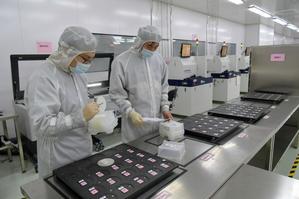 Employees perform tests on semiconductor chips at the production facility of a Nanchang, Jiangxi province-based high-tech company on Feb 13, 2020. (PHOTO / XINHUA)
Employees perform tests on semiconductor chips at the production facility of a Nanchang, Jiangxi province-based high-tech company on Feb 13, 2020. (PHOTO / XINHUA)
The US government's proposed new restrictions on exports of certain semiconductor and aircraft components to China would hurt the interests of US companies and further disrupt the global supply chain, experts said on Tuesday.
The comments came after Washington on Monday proposed rules that would expand license requirement controls on exports of certain products to Chinese companies linked to the military.
According to the new proposed rules, published on the official website of the US Department of Commerce, licenses will be needed for US companies to sell certain items to companies in China that have ties to the military, even if the products are meant for civilian use
Bai Ming, a senior research fellow with the Chinese Academy of International Trade and Economic Cooperation, said, "The global supply chain already risks fragmentation amid the COVID-19 pandemic, and the latest move from the US government would make things worse."
ALSO READ: Xi calls for efforts to ensure smooth global supply chain
According to the new rules, published on the official website of the US Department of Commerce on Monday, licenses will be needed for US companies to sell certain items to companies in China that have ties to the military, even if the products are meant for civilian use. They will also remove a civilian exception that allows certain US technology to be exported without a license.
The rules were posted for public inspection and would be published in the Federal Register on Tuesday, Reuters reported.
The new rules blur the line between civilian and military use, which will make it difficult for some Chinese civilian companies to buy products and technologies from US companies. The move will harm the US semiconductor industry and affect sales of civil aviation parts to China, Bai added.
John Neuffer, president and chief executive of the US Semiconductor Industry Association, told Reuters that the industry was concerned that broad rules will "unnecessarily expand export controls for semiconductors and create further uncertainty for our industry during this time of unprecedented global economic turmoil".
Boston Consulting Group said in its latest report that if the US increases restrictions on the semiconductor trade with China, it could endanger its own position as leader in the sector, the report added.
BCG warned that if shipments of US chips and chipmaking equipment to China were stopped, and China were to ban imports of US electronics and software, it could cost US companies 37 percent of their annual sales.
READ MORE: Closer global cooperation, not trade restrictions, essential
The US government's ban on restricting Chinese tech company Huawei from buying US chip technologies has already weighed on sales of semiconductor heavyweights, including Qualcomm Inc.
BCG found that the top US semiconductor makers have reported a median revenue decline of between 4 percent and 9 percent in each of the three quarters following the Huawei ban in May 2019.
Wei Shaojun, a microelectronics professor at Tsinghua University, said China is one of the world's largest semiconductor markets. In 2019, the nation spent US$304.1 billion on imported chips. That marked a decline of 2.6 percent from a year earlier because domestic semiconductor companies have made progress in meeting demand.
Yang Xu, president of Intel China, said earlier this month that the semiconductor industry is highly specialized and needs global cooperation.



